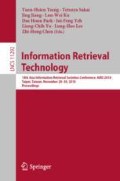Abstract
This paper investigates the trend of relevant text fragments by task type. The search results of fine-grained information retrieval systems propose not documents but text fragments. We hypothesize that the properties of relevant text fragments depend on the task type. To reveal these properties, we evaluate a relevant text fragment to judge (1) its granularity (e.g., word, phrase, or sentence) and (2) its structural complexity. Our analysis shows that a task type based on more complex information needs has a larger granularity of relevant text fragments. On the other hand, the complexity of task type’s information needs does not necessarily correlate with the structural complexity of the relevant text fragments.
Access this chapter
Tax calculation will be finalised at checkout
Purchases are for personal use only
Notes
- 1.
- 2.
- 3.
- 4.
References
Anderson, L.W., et al.: A Taxonomy for Learning, Teaching, and Assessing: A Revision Of Bloom’s Taxonomy of Educational Objectives. Longman, New York (2002)
Broder, A.: A taxonomy of web search. ACM SIGIR Forum 36(2), 3–10 (2002)
Byström, K., Järvelin, K.: Task complexity affects information seeking and use. Inf. Process. Manag. 31(2), 191–213 (1995)
Campbell, D.J.: Task complexity: a review and analysis. Acad. Manage. Rev. 13(1), 40–52 (1988)
Hu, X., Kando, N.: Task complexity and difficulty in music information retrieval. J. Assoc. Inf. Sci. Technol. 68(7), 1711–1723 (2017)
Arguello, Jaime: Predicting search task difficulty. In: de Rijke, M., et al. (eds.) ECIR 2014. LNCS, vol. 8416, pp. 88–99. Springer, Cham (2014). https://doi.org/10.1007/978-3-319-06028-6_8
Kato, M.P., Sakai, T., Yamamoto, T., Pavlu, V., Morita, H., Fujita, S.: Overview of the NTCIR-12 MobileClick-2 Task. In: Proceedings of the NTCIR-12, pp. 104–114 (2016)
Kelly, D., Arguello, J., Edwards, A., Wu, W.: Development and evaluation of search tasks for IIR experiments using a cognitive complexity framework. In: Proceedings of the ICTIR, pp. 101–110 (2015)
Li, J., Huffman, S., Tokuda, A.: Good abandonment in mobile and PC internet search. In: Proceedings of the the 32nd SIGIR, pp. 43–50 (2009)
Manabe, T., et al.: Information extraction based approach for the NTCIR-10 1CLICK-2 Task. In: Proceedings of the NTCIR-10, pp. 243–249 (2013)
Tojima, T., Yukawa, T.: Query classification system based on snippet summary similarities for NTCIR-10 1CLICK-2 task. In: Proceedings of the NTCIR-10, pp. 250–254 (2013)
Wildemuth, B., Freund, L., Toms, E.G.: Untangling search task complexity and difficulty in the context of interactive information retrieval studies. J. Doc. 70(6), 1118–1140 (2014). https://doi.org/10.1108/JD-03-2014-0056
Yoshioka, M.: Query classification by using named entity recognition systems and clue keywords. In: Proceedings of the NTCIR-10, pp. 255–259 (2013)
Acknowledgments
This work was partly supported by ACT-I, JST.
Author information
Authors and Affiliations
Corresponding author
Editor information
Editors and Affiliations
Rights and permissions
Copyright information
© 2018 Springer Nature Switzerland AG
About this paper
Cite this paper
Keyaki, A., Miyazaki, J. (2018). Analysis of Relevant Text Fragments for Different Search Task Types. In: Tseng, YH., et al. Information Retrieval Technology. AIRS 2018. Lecture Notes in Computer Science(), vol 11292. Springer, Cham. https://doi.org/10.1007/978-3-030-03520-4_6
Download citation
DOI: https://doi.org/10.1007/978-3-030-03520-4_6
Published:
Publisher Name: Springer, Cham
Print ISBN: 978-3-030-03519-8
Online ISBN: 978-3-030-03520-4
eBook Packages: Computer ScienceComputer Science (R0)

